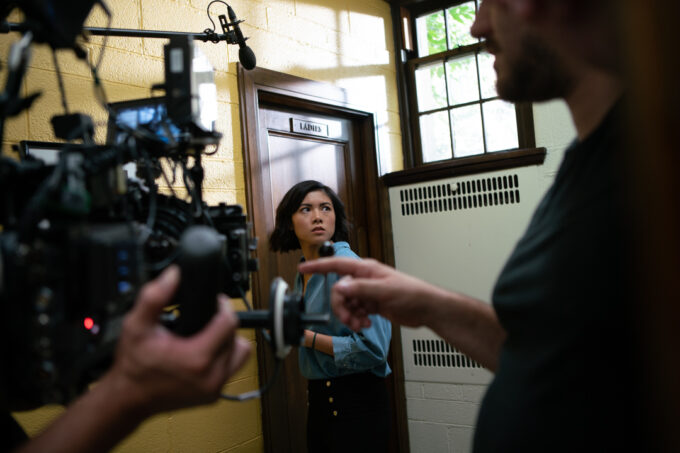Written By: Saiya Floyd
On its surface, “Stealing School” is about the academic trial of an undergrad student accused of cheating on her final paper. But the film — writer/director Li Dong’s feature debut — is made stronger by the various subplots which explore ideas of racism, perception and integrity. The story follows April Chen (Celine Tsai), an undergrad days away from graduation, who has to sit before an academic tribunal after her TA Keith Ward (Jonathan Keltz) accuses her of plagiarism.
Li — who we spoke to via email — got the inspiration for the story from a few places. The first was the Israeli movie “Gett” (2014), which is about a woman appealing to a panel of rabbis to grant her a divorce. The second inspiration came from rumors Li heard at his own school. “I had heard whispers about these shady tribunals during my time in university. They were a sort of dirty secret in academia … which of course piqued my interest.” Something clicked with Li. “Those two things kind of came together in my head at some point and I realized I had a story vehicle that would allow me to talk about all the things I cared about such as race, gender and the inherent value of a liberal arts education in the modern world.”
The film straddles a thin line between comedy and drama. As the characters themselves repeatedly point out — this is not a real legal trial, leaving them sometimes unsure what the protocols are. Sometimes the film wobbles between these transitions to comedy and drama, but ultimately sticks the landing. There is comedy in the absurdity of this pantomime of a court, where no one except Keith actually wants to be there. Early on, April’s student advocate, a law student (Mpho Koaho) admits that he’s only there because it’ll look good on his resume. But underneath this humor, there are real stakes: if April is found guilty, she will not graduate.
April isn’t the only one with a lot riding on the outcome of the trial. The university is working hard to appeal to international students, so they can’t appear to be persecuting a student of Chinese descent without cause, but they also must investigate accusations of plagiarism. Early on, it is revealed that someone within the “court” room is leaking the proceedings to a student reporter. The university is unaware of this, so it’s a question of if the university will catch on, and how much damage will be done. There also is tension between April — a computer science major — and Keith — a liberal arts grad student. Keith thinks April looks down on him and his field, and her alleged cheating is just another sign of this contempt.
The film does question what is the value of a degree, and whether or not certain degrees have more value in the real world. Li was coy on where he lands on the issue, saying he sees both sides. “At the end of the day I do firmly land on one side of the argument over the other … but I don’t want to say which side”. April has a job offer in Silicon Valley waiting for her after graduation. Keith has few future prospects. His witch hunt against April seems like a last ditch effort for him to justify the inherent value of his field — that if he can prove her cheating, and punish her for her disrespect, he will gain some respect himself. The problem is that in the process of the trial, he starts to alienate anyone that might be able to help him in post-grad life, but this only makes Keith more desperate to prove his case.
Keith is an intellectual snob and uses race as a weapon in his crusade against April. Keith isn’t the only one guilty of racist comments or microaggressions, but his interrogation of April’s Japanese/Canadian roommate about how she feels about April’s paper on the atomic bombing of Japan and asking about why “her people” surrendered WWII felt like a particularly low point for him. Later on in the film, Keith is saved from being a cartoonish villain by moments where Li and Keltz dig into his insecurities. It doesn’t justify his relentlessness in proving April’s guilt, but it does make him seem more real. And though it’s hard to feel sympathy, one might feel pity.
It’s easy to be on April’s side from the beginning, especially when she faces off against the dogged Keith. She points out she lacks a motive to cheat — she would have a job in Silicon Valley regardless of whether or not she graduates. She calmly asserts that she is not a victim; she just wants to defend her good name. Tsai plays April with a confident dignity, and it’s hard not to root for her. But as the trial goes on, cracks start to appear in April’s facade. Some of the evidence against her isn’t so clear cut and could go both ways. At first, it’s easier to give April the benefit of the doubt than concede a point Keith makes because April is just a lot more likeable. But likeability isn’t innocence, and as the trial drags on, there are some gaps that April has a harder time explaining away. Is she hiding something, or is it the stress of a long day having to defend her reputation?
The complexity of the characters is something Li strives for. “My philosophy on diverse representation on screen is that you have to show everyone as well-rounded characters, which means giving them very human faults. I think the key to getting people to empathize with people who don’t have the same background as they do is by showing their weaknesses or insecurities or self-destructive qualities.”

As for why this story was the one Li wanted to explore for his feature film debut, “Honestly it was cheap and it allowed me to be funny and weird and also demonstrate that I had some directing chops. As a young(ish) director trying to prove your worth, you can’t ask for much more out of a first feature.” The cheap refers to the fact that the film is mostly filmed in a single room. “It was tough. I think Spielberg once said that a good way of keeping the audience’s interest in the story is to just never go to the same location twice … which is not something I (or anyone?!?!?!?!) could afford on a first feature”. To keep the audience engaged, Li varied the visuals by having the characters venture to other parts of the building when court adjourned for break. He tackled this by changing things within the room itself by playing with angles and lighting to make it seem like there were new locations within the same room. The film’s mostly singular setting serves the story well — none of the characters want to be there, so by the time we reach the climax, things start to feel claustrophobic.
Ultimately, Li’s goal was to surprise. “I think the creator of ‘The Sopranos’ said that basically our only job as writers is to surprise the audience.” Mission accomplished. As the film builds towards answering the central question of whether or not April is guilty, it poses another question. With each character’s secrets and hidden agendas coming to light: how much does the truth really matter?
“Stealing School” is screening at the 43rd Asian American International Film Festival. Ticket and screening information can be found here.

